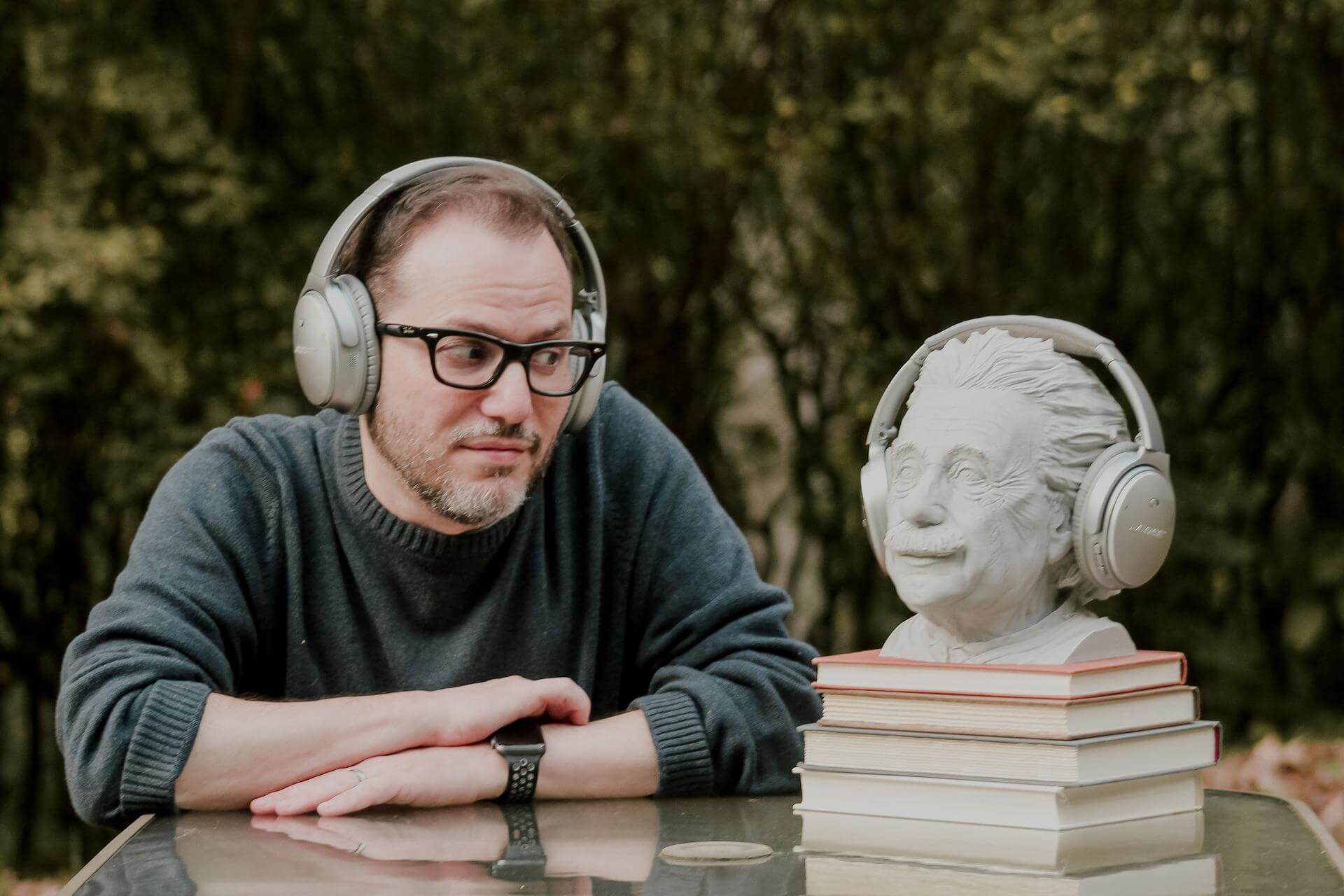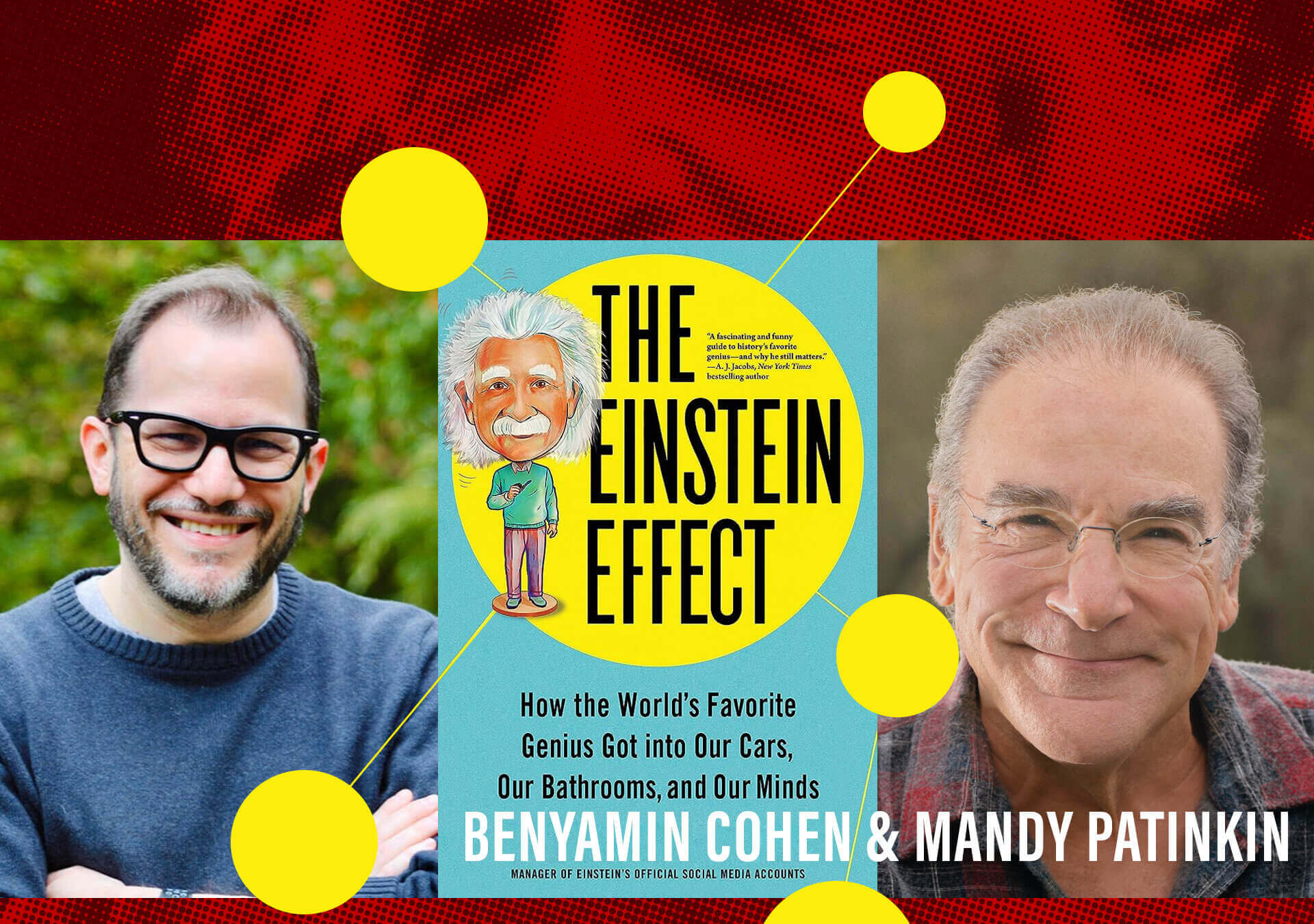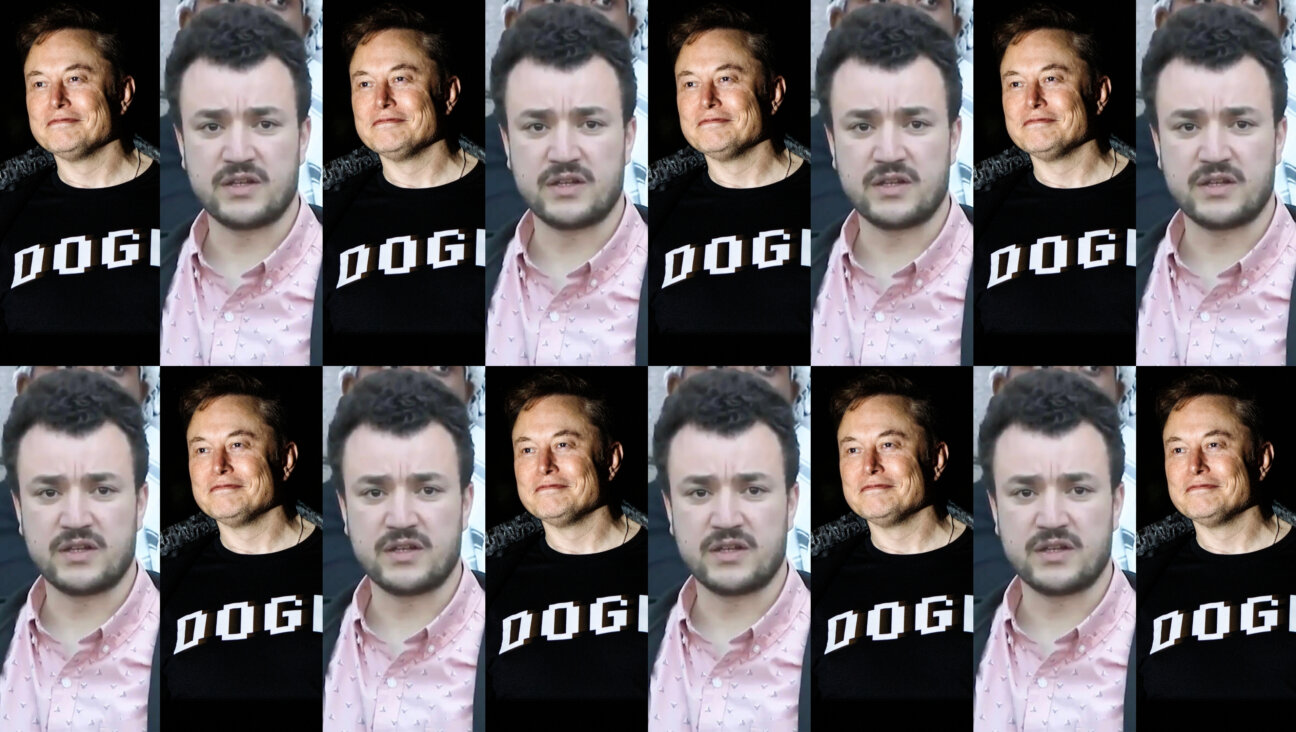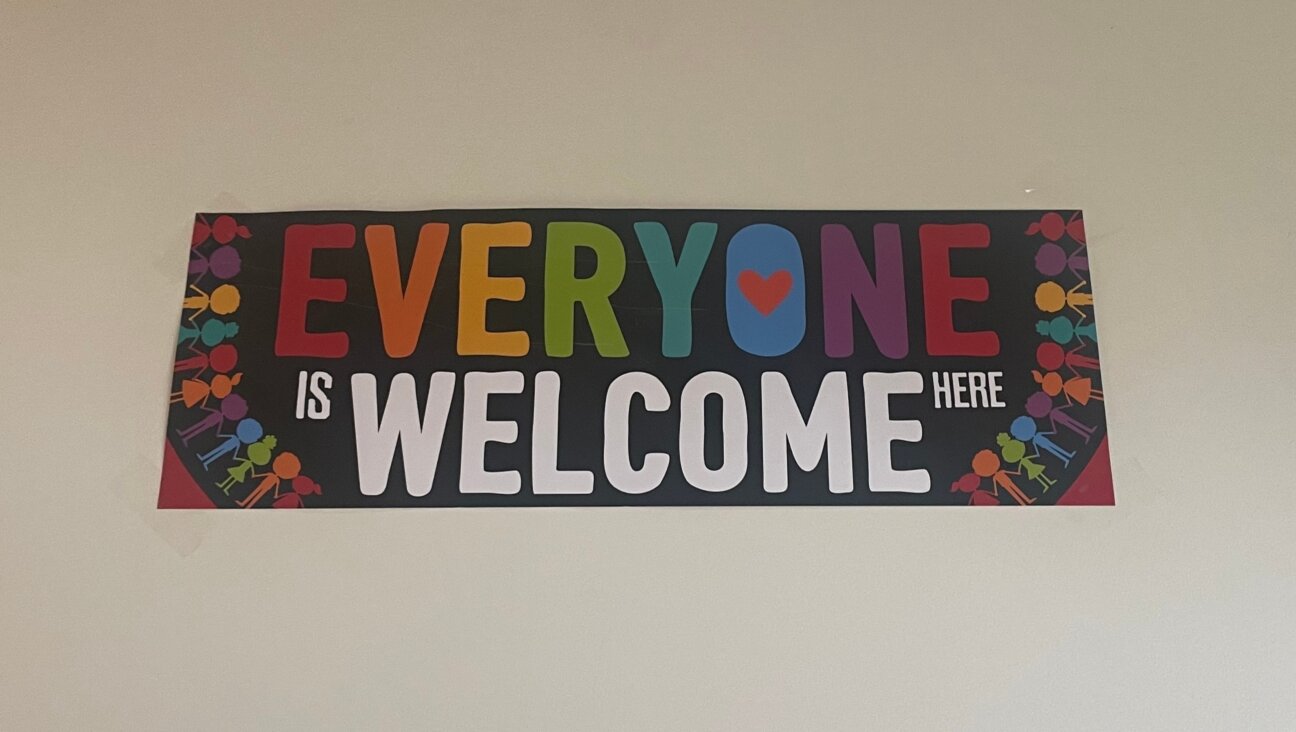How a Forward journalist came to hold a piece of Albert Einstein’s brain
Plus, what wine you should drink on Rosh Hashanah and more

Graphic by Angelie Zaslavsky
Our news director is not a scientist, but he plays one on social media. And not just any scientist: a Nobel laureate in physics (1922), Time magazine’s Person of the (last) Century, the most famous scientist of all time — or, as he likes to put it, “the world’s favorite genius.”
That’s right: Benyamin Cohen, that guy who pops in your inbox most mornings as host of our Forwarding the News newsletter, has a side hustle running Albert Einstein’s Twitter, Instagram, Threads and Facebook feeds. Where he — they? — has 20 million followers.
“This guy has been dead for nearly 70 years,” Benyamin pointed out, “and he has more followers than Tom Hanks, more than the Rolling Stones.”
Yesterday, Benyamin posted a #Throwback Thursday pic of Einstein on a beach in Belgium with a mathematician named Walther Mayer. This morning — #FanArtFriday — he featured a miniature Einstein from an Instagram account called magicmidjourney that posts an AI-generated image of you-know-who each day.
“What’s most fascinating to me, the non-scientist, is how pervasive in the culture Einstein still is outside of science,” Benyamin, who is 48, noted when we chatted this week about his years-long obsession — and his new book, The Einstein Effect: How the World’s Favorite Genius Got Into Our Cars, Our Bathrooms, and Our Minds.
He ticked off a few examples: A parrot at a zoo in Knoxville, Tennessee, with a big vocabulary is named Einstein. A guy in Europe who made a huge colorful Einstein portrait out of M&M-like candies. A woman from Istanbul won gold at the 2016 International Culinary Olympics for an Einstein-shaped cake, using crystallized sugar for the famous wild white hair.
“All these people who are not physicists — like me — who don’t know, you know, theory of relativity — they’re still inspired by Einstein,” Benyamin said. “All these people feel some kind of connection to him. You don’t see that about Galileo, or Shakespeare, or Newton, or Tesla. None of these people have that kind of mainstream appeal.”
When Benyamin says he is not a science guy, he means it. For the elementary school science fair, while others were blowing things up or building machines, he made “rainbow soda,” mixing Fanta, Coke, Sprite and the like, asking fairgoers to guess the ingredients. “I was skating by as best I could because science was totally not my subject,” he explained.
At Georgia State University, Benyamin took a geology class to fulfill the science requirement — and, he recalled, “got so bored that I stopped attending classes mid-semester.” About that same time, he read a book called Driving Mr. Albert that changed his life.
The book was by a magazine journalist, Michael Paterniti, who drove cross-country with the pathologist who stole parts of Einstein’s brain after performing the autopsy in 1955. Benyamin was intrigued by the craft of the long-form non-fiction narrative — and by the quirky obsessive character at its center.
Flash forward a decade or so to 2015, and Benyamin is working at a Jew-ish website where his editor encouraged him to “write anything you want as long as it’s interesting.” He saw a squib about Einstein’s pipe going up for auction and turned it into an article. That same editor always said, “spend half a day writing the article and the other making sure it finds an audience.”
That’s when Benyamin discovered that the world’s favorite (Jewish) genius had 20 million followers on Facebook. He sent a note to the page “and literally within a few minutes I see the three dots come up on the screen: Albert Einstein is writing back to me on Facebook Messenger!” Benyamin recalled. “It was this 20-something kid who worked for the Albert Einstein estate doing social media. And he shared it that afternoon. And we got this spike in traffic — so much so the website actually went down.”
Benyamin set up a Google alert to flag Einstein tidbits and pretty much made the scientist his beat. He and the 20-something kid doing social media — actually a lawyer named Tony Iliakostas — became friends, and when Tony quit the Einstein gig in 2017, Benyamin was the obvious choice to take it over. He’s pretty much been gathering fodder for the book ever since.
There’s plenty of science in the book: It explains in relatively simple terms how the theory of relativity led to the development of GPS — and thus how Einstein is basically responsible for our ability to get a pizza delivered anywhere.
But the book is in many ways more about obsessives — the pathologist who stole the brain and the one who inherited it from him; a hermit who has devoted his life to developing a time machine; a guy with a huge collection of famous people’s hair; and Benyamin himself. Besides the world’s favorite genius, Benyamin can’t get enough of Back to the Future; 90-Day Fiancé; and auctions of everyday items that belonged to famous people — not just Einstein’s pipe but also the torn pants of a Haredi rabbi.
The big question underlying the book is why: Why is Einstein so broadly beloved, so ubiquitous, so iconized, so followed on Facebook.
“First of all, he came about at the moment when almost all of modern media was in place — you know, newspapers, magazines, photographs, radio, television,” Benyamin began. “And he played to the camera. Every time the paparazzi would follow him around he’d take his hat off and throw it up in the air, because he knew the paparazzi loved that photo of him tossing his hat in the air. Marie Curie never tossed her hat in the air. Marie Curie hated giving interviews, Marie Curie didn’t play into that role of public persona.
“He had no airs about him,” Benyamin continued. He always looked unkempt and disheveled. He walked around in pajamas. He was always sock less. That broke down a lot of barriers.
“We just saw Oppenheimer, right?” Benyamin said, of course referring to the mega-biopic of the (Jewish) inventor of the atomic bomb. “Oppenheimer was not like that. Oppenheimer didn’t seem like an approachable person, a charismatic person. Someone who a 10-year-old kid can pull on his suit jacket and say, ‘Dr. Oppenheimer, can you help me with my science homework?’ But Einstein, those kids did walk up to him on the street and say, ‘Dr. Einstein can you help me with my science homework?’ And he sat there and helped them with their science homework.”
“All these people feel some kind of connection to him. You don’t see that about Galileo, or Shakespeare, or Newton, or Tesla. None of these people have that kind of mainstream appeal.”
– Benyamin Cohen, author, The Einstein Effect
There are plenty of Jewish tidbits throughout the book, including interviews with not one but two Rabbi Einsteins — a father-daughter duo whose relation to the world’s favorite genius is unclear.
Einstein himself was very connected to his Jewish heritage, helping rescue thousands of Eastern European Jews from Nazism starting in 1933. He was also a committed Zionist: His first visit to the U.S. was on a 1922 fundraising tour for the future state of Israel with Chaim Weizmann; he helped found Hebrew University in Jerusalem; and when Weizmann died in 1952, David Ben-Gurion asked him to take over as Israel’s president (Einstein declined).
I asked Benyamin what Einstein would say about the political turmoil roiling the Jewish state today, about the Israeli government’s efforts to strip power from the Supreme Court.
“I’m sure he would be in the streets protesting,” Benyamin said. “Einstein was a very left-wing, liberal person. Although he was a really big believer in the Jewish state, he was not a believer in nationalism, because he saw what could happen, what nationalism could lead to. He was a pacifist, he didn’t like militarism. I definitely think he would be against the judicial overhaul and in favor of keeping Israel as much a democratic state as possible.”
You won’t find that on Einstein’s Facebook page. Benyamin stays away from politics, for fear of alienating half the followers on any subject — and generally downplays Einstein’s Jewishness. Though among artifacts he has unearthed over the years is the mohel’s ledger listing baby Albert’s ritual circumcision back in Ulm, Germany, in 1879. (His Hebrew name was Avraham.)
“He was not religious at all, but he was very spiritual,” Benyamin said. “You know, studying the cosmos and the universe, he frequently talked about how this is not something that happens on its own, that there’s a divine hand guiding all of this. He knew that God was there. And he was trying to uncover the mysteries of the Divine.”
Benyamin thinks of himself as the opposite — religious but not spiritual. But as he was finishing up the book, when he finally got a meeting with the pathologist who now has the remaining pieces of Albert Einstein’s brain in a series of little jars, something happened.
“Holding Einstein’s brain was a very spiritual experience for me,” he said. “It’s the last physical vestige of Albert Einstein and I’m holding it. What his brain represents. This is what he’s famous for, his brain. I nearly wept.
“I don’t get spiritual when I go to the Western Wall. I don’t get emotional when I go to synagogue,” he continued. “I’d interviewed all these people, scientists and historians, I’d read all these books — It was all third-party information. Here I am face to face with Albert Einstein. There’s no intermediary anymore. Obviously I couldn’t speak to Einstein, I couldn’t ask him questions, but I felt holding his brain as close to Einstein as anyone in 2023 can feel.”
As you’ll learn in the book, there are actually hundreds of slivers of Einstein’s brain scattered around the world — the original doctor who did the autopsy sent them to brain researchers for further study. But he kept most of it, pickled and preserved in Mason jars, and passed down before he died in 2007 to another pathologist at Princeton.
Benyamin would like to have a piece of Einstein’s brain. He’d put it on his desk in West Virginia, next to the Einstein bust that holds his headphones.
Thanks to Odeya Rosenband for contributing to this newsletter, and Adam Langer for editing it.
Shabbat Shalom! Questions/feedback: [email protected]
JOIN THE CONVERSATION
UPCOMING EVENTS
One of the most intriguing chapters in Benyamin’s book is about Einstein’s 1933 founding of a refugee aid group that became the International Rescue Committee — and how the world’s favorite genius inspired the actor Mandy Patinkin to become the group’s ambassador. Next month, I’ll be moderating a conversation with Mandy and Benyamin at the Temple Emanu-El Streicker Center in New York. Click here or on the image below to attend in-person or online.

And now that you know what Einstein might have thought about Israel’s judicial overhaul, find out what a couple of today’s experts have to say about it. Our Laura E. Adkins will be in conversation with Danny Gordis of the Shalem Center and Dahlia Schiendlin, a public opinion analyst, on Monday, a day before a critical Supreme Court hearing.
Click here or on the image below to register for this free virtual event.
WATCH: ROSH HASHANAH WINES
Our columnist Rob Eshman and opinion editor Laura E. Adkins dish on some of the most-hyped kosher wines being offered for the High Holidays, and talk about how to pair libations with your Rosh Hashanah meals. Watch the video below or read the highlights here.
|






























